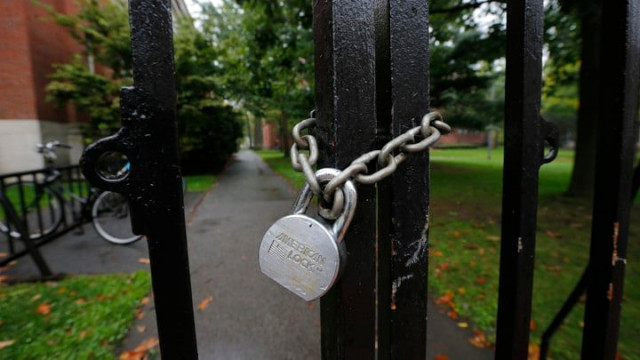Sindh govt seizes 65 properties of banned organisations
CM Murad Ali Shah briefs US delegation on steps taken to curb terror financing

A Reuters representational image.
According to the CM, 59 properties of Jamaat-ut-Dawa (JuD), Falah-e-Insaniat Foundation (FIF) and Jaish-e-Mohammad (JeM) and six of Tehreek-i-Taliban Afghanistan have been seized.
"Sindh is a land of Sufis and its people are tolerant. Therefore, the existence of any proscribed organization or entity has not been traced here," said Shah. The CM added that this was why no arrest or prosecution of any individual has been done in connection with the UN Sanction Regime 1267 and 1373.
Referring to cases related to terror finance, Shah said that 47 such cases have been registered and are being investigated by the Counter-Terrorism Department (CTD) of Sindh police.
Speaking about non-profit organisations (NPOs), the CM said that 527 or 11.5 per cent of all active NPOs were surveyed to assess their vulnerability to terror financing. According to Shah, the survey data has been shared with the federal ministry of interior as well. He said that 4,693 inactive or non-functional NPOs have been deregistered, while another 2,828 inactive NPOs were in the process of being deregistered by the social welfare department. Besides, 1613 NPOs registered with the industries and commerce department are also in the process of being deregistered. According to Shah, there are 25,426 NPOs in Sindh, of which 14,834 are registered with the industries department and 10,592 with the social welfare department. The CM said that 19 NPOs are under investigation in Sindh, and of these 14 NPOs are affiliates of proscribed organisations such as JuD, FIF, and JeM while five of them are being investigated for their vulnerability regarding terror financing.
The CM further said that action would be initiated against unregistered NPOs after the enactment of the Sindh Charities Act 2019 while adding the draft law has been approved by the Sindh Cabinet.
According to Shah, various policies such as registration of NPOs and the standard operating procedures (SOPs) regarding the collection of skins and hides have been issued and are being implemented in order to address issues pertaining to terror financing.
With regards to steps taking by the Sindh government against money laundering, Shah said that he has constituted a taskforce on anti-money laundering under the home secretary. The task force has directed stakeholders such as Pakistan Customs, Airports Security Force and the Federal Investigation Agency (FIA) to establish currency detection units at major airports to detect and deter currency smuggling. He added that the capacity building of government officials was done through seminars and workshops with relevant stakeholders including district commissioners, commissioners, secretaries of relevant departments and agencies. The UNSC Sanctions were explained and all relevant guidelines were shared with the participants.
The visiting delegation appreciated the efforts made by the provincial government to control terror financing.
Published in The Express Tribune, October 3rd, 2019.



















COMMENTS
Comments are moderated and generally will be posted if they are on-topic and not abusive.
For more information, please see our Comments FAQ